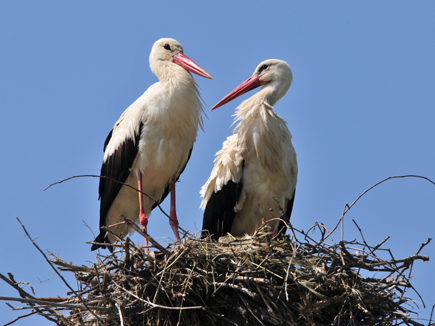
Europe’s White Storks are endangered by habitat loss.
© Guido Sachse
International “European Stork Villages” conference and celebration in Velika Polana (Slovenia)
press release, August 10th, 2013
Radolfzell. From August 7th to 10th, 2013, Slovenia hosted the 10th annual conference of the European Stork Villages network. About 40 participants from 10 countries gathered in the Stork Village Velika Polana to develop solutions for the future of stork conservation and to strengthen the network of European Stork Villages. In recent years, some regions showed a recovery of White Stork populations. But the ongoing degradation of their feeding grounds is seriously threatening the animals. Wet meadows and pastures are now rare in Europe. “In order to ensure the storks’ future, we have to further expand and connect stork conservation programmes”, says EuroNatur CEO Gabriel Schwaderer.
By means of its initiative “European Stork Villages”, EuroNatur is for many years counteracting the increasing habitat loss of storks in Europe. Since 1994, the foundation is awarding the title “European Stork Village” to communities that are home to a big number of storks and that are notably active in stork conservation. Velika Polana and its neighbouring village Mala Polana received the award in 1999. Here, both the local administration and the villagers are for many years actively helping these elegant gliders. For example, the community is supporting non-intensive pasturing of the species-rich meadows around the two villages in order to conserve and improve the storks’ valuable feeding grounds.
The conference was part of the weeklong stork festival, an annual event by local NGO ŠTRK (en.: stork) for the people to celebrate their storks. Offering a diverse music programme and various attractions, this summer event again drew thousands of visitors from the region to Velika Polana. As an example, the stork festival organisers tried to achieve an entry in the Guinness Book of Records: Together with several festival participants they cooked one ton of a traditional beet stew over an open fire. “Cultural activities like the stork festival create public attention beyond the region and contribute to making people aware of the protection of storks and their habitats”, says Gabriel Schwaderer.
Background information:
- European Stork Villages
- EuroNatur projects for the protection of the White Stork
Queries:
EuroNatur, Konstanzer Str. 22, 78315 Radolfzell, Tel.: 07732 - 92 72 24, Fax: 07732 - 92 72 22, E-Mail: info@euronatur.org, Internet: www.euronatur.org, Contact: Gabriel Schwaderer, Press contact: Angie Rother


